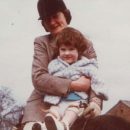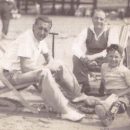Trips
Ronald Leedham: Awful Sundays
Ronald Leedham was born in 1929 in India. His family moved back to England in 1931after Ronald contracted Polio. Ronald spent some years in Hospital as a young child after contracting Diptheria. When he was six he returned home to Catford for a short while to live with his father, eventually ending up living in ‘homes for crippled children’ run by the Shaftesbury Society, until he was sixteen.
More from
Ronald Leedham
- Shame
- Suitcases
- Incendiaries in the park
- Boys and girls together
- Sheltering in the Church
- Greyness
- Shut Away and Tipped Out
- Beatings
- Mum
- Shelter
- Difficult subject
- Buzz Bombs and Doodlebugs
- Home
- A Miserable Time
- No talking
- Oliver Twist
- Explosives
- Lead Soldiers
- Oliver Twist and donk
- Visits
- Cricket at Sevenoaks
- Parlour Songs
- ‘Mummy coming’
- I Knew Nothing About Life
- Visiting every six weeks
- The Walk to Church on Sunday
- Geography
- Certificates
- War starts
- The Glow over London
- Dogfight
Here Ron remembers the indignity of being marched to church.
Transcript
And so all us boys had to walk down there every Sunday morning. 50 boys, some about that high and some that high, all of us disabled, clanking, callipers, we all had to wear short trousers of course, cos you didn’t wear long trousers until you were about 16 in those days. You never see kids in short trousers now but we all had to have short trousers and our school uniform with our caps and jacket, short trousers. Shoes polished, boots polished, this, that and the other and we all had to walk down there. We must have looked a right sight. Kids with great humps on their backs, heads on one side cos they couldn’t hold them up, staggering around on one leg, pushing themselves, clanking crutches, sticks.Can you imagine it? I don’t think you can. It was awful and we made a public display of ourselves on the main road going from Hurstleigh into town. Sometimes we had to walk right through the town to the Congregational church at the other end of town or the Baptist church halfway down or something like that but all of it was this great long crocodile of ill-formed boys of different ages, staggering along the pavements. It was awful, I can visualise it now. We hated it, we couldn’t do a thing about it. The indignity, the lack of grace, the shame. Being a spectacle like something in a circus. It was awful and the staff didn’t seem to notice,the staff didn’t seem to notice. And then you went into the church itself and each of the churches, because we did it regularly, we had a block of seats and we all used to crowd into this thing and of course everybody used to see us.
Oh dear, it was awful, it was... disgraceful is the only word I can think of, the lack of consideration that our so called carers could subject young boys to. Young boys are very conscious of themselves, same as young girls are and some of those kids were well into puberty and they were conscious of their body image and there were people, other girls, normal girls in the town, staring at you when you’re staggering along like that with no dignity. It was shameful, absolutely shameful. And you did that every day, every Sunday. And you went into the church and everybody stopped and looked as you staggered down the aisle. You know what it is when people are going into church, going down the aisle, it’s all hushed and there’s us kids squeaking and clunking. Not funny, it wasn’t funny and we all felt afterwards, when we got back, we were all a little bit subdued. We all suffered for it. The older you were, the worse it was. When you were young, you probably didn’t notice it so much, you were just one of the boys. But when you got older, you’d notice that there was people that looked at you, some with disgust, some almost laughing at you. It’s not right.
But then again, as I pointed out, there was a good side to it in that it was wartime. The roads were full of convoys, army, air force and the Yanks were particularly good because they used to go by in their tens of thousands and they had lots of sweets...(Laughing) and as we walked along these convoys would be going down with blooming lorries full of Yanks and they’d be chucking sweets at you and bars of chocolate and everything else. There was a good side to it but the rest of it, that didn’t happen all that often but when it did, it was worth it. But oh dear, they were terrible traumatic days.
Explore more
Explore stories by theme or view the timeline of significant events in education for disabled people
![How Was School? [logo]](https://howwasschool.allfie.org.uk/wp-content/themes/hws-base-theme/assets/img/allfie-logo-original.svg)



